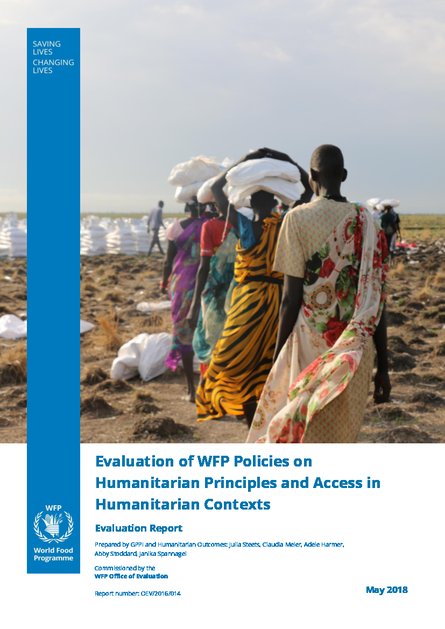
This evaluation report assesses the World Food Programme’s (WFP) policies on humanitarian principles and access, its progress implementing the policies, and the factors affecting the results observed. It is based on a mix of data-gathering tools and methods, including field visits, interviews, surveys with staff, partners and communities, network analysis, media and social media analysis, and a multi-level regression analysis.
The report finds that WFP’s policies on humanitarian principles and access remain highly relevant at a time when both the number of protracted emergencies and the politicization of the aid environment are on the rise. The policies are largely coherent, but WFP has not invested sufficiently in their dissemination and implementation, leading to a highly variable understanding of humanitarian principles across the organization, and a lack of clarity about important aspects of WFP’s approach to access.
The evaluation team found that access restrictions had the most severe effect on WFP’s ability to conduct needs assessments and monitoring activities. By working through partners, it enjoys relatively strong access for delivering food assistance. The regression analysis conducted for this evaluation found that WFP’s coverage is particularly strong in difficult operating environments.
With regard to its core humanitarian principles, WFP enjoys a positive reputation for humanity and performs relatively strong on impartiality. Perceptions of WFP’s neutrality are less positive, especially among external stakeholders, owing to its close relationship with host governments and its reliance on the use of armed escorts, particularly in conflict situations. WFP’s operational independence was found to be constrained by its dependence on inflexible funding from a relatively small pool of donors.
Crucial factors affecting WFP’s performance on humanitarian principles and access include its mandate, organizational culture, relationships with partners, relationships with host governments and armed non-state actors, institutional processes and capacities, and security management.
The report recommends that WFP pay more attention to humanitarian principles, including in situations where there are trade-offs between access and humanity on the one hand, and impartiality, neutrality, or operational independence on the other. It also recommends that WFP significantly increase its investment in the dissemination and implementation of the policies, including by strengthening staff competencies, designating responsibilities for humanitarian principles and access at the country level, prioritizing humanitarian principles when engaging with cooperating partners and commercial providers, investing in its use of needs assessment data and its security capacity, and strengthening dialogue and advocacy with donors.